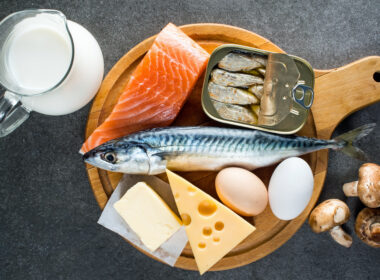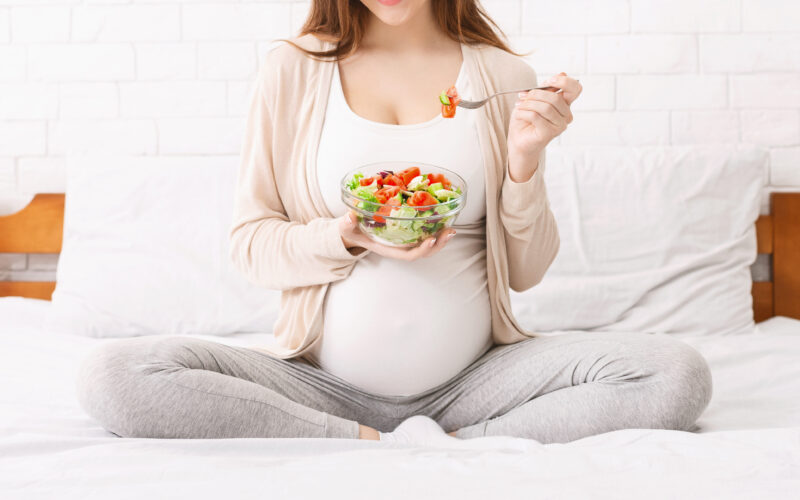As an expecting mom, you probably received a number of (unwelcomed?) comments about your eating habits and advice on a pregnancy diet. Likely, you already got scores of articles in your inbox about what you should or should not eat (or drink) during your pregnancy. If you’ve done some reading on your own, you may have come across conflicting information about consuming fish during pregnancy, what nutrients are most important for a healthy pregnancy, how much salt you should consume, etc.
How do you sort out the wheat from the chaff among this abundance of information?
What about your medical providers? While you are likely having frequent OB checkups, unfortunately you may not be receiving much practical information at those visits about proper nutrition.
A good pregnancy diet is important for two main reasons:
- To give yourself the best chance for a healthy pregnancy and eliminate some discomfort
- To give your baby the best chance at healthy growth and development in utero and beyond
This article reviews the recommendations from different authors who have grounded their pregnancy diet suggestions in substantial research.
Conventional guidelines about nutrition during pregnancy are not always evidence-based
During my last pregnancy, I listened to an episode of the Evidence-Based Birth Podcast on nutrition during pregnancy, featuring registered dietitian and certified diabetes educator, Lily Nichols. I was intrigued to learn that Nichols wrote a book on this topic, titled Real Food During Pregnancy, and found myself drawn in by the following assertion in her introduction:
“In short, current research finds that the nutrients most commonly lacking in the prenatal diet—like Vitamins A, B12, B6, zinc, iron, DHA, iodine and choline—are found in the very foods you’re told to limit by conventional prenatal nutrition guidelines.” (Nichols, xvi)
I was also struck by her statement that “the more carbohydrates you eat—especially refined carbohydrates—the fewer micronutrients your diet contains (meaning vitamins and minerals), and the higher your chances of developing pregnancy complications.
My research seemed to confirm Nichols’ assessment, as I learned that while the Food and Nutrition Board of the National Academies of Sciences, Engineering, and Medicine convened as recently as January of 2020 to update their guidelines, their previous recommendations were based on reports from 1990 and 1991.
With 930 research citations over the course of 255 pages of content, I felt reasonably confident that Nichols did her homework, so her book became my primary source material for this article. I also cite relevant sections of the American College of Obstetricians and Gynecologists (ACOG) guidelines on nutrition during pregnancy as well as material from the late respected fertility and nutrition expert, Marilyn Shannon, in her book, Fertility, Cycles, and Nutrition, and childbirth educator and certified birth doula, Mary Haseltine, in her book, Made for This.
Are pregnant women “eating for two?” How many additional calories do pregnant women need per day?
Many women already know that caloric needs remain virtually unchanged from prepregnancy during the first trimester. In the second and third trimesters, Nichols notes that many women only need about 300 additional calories each day, though that is simply an average—some women may actually need as few as 70 additional calories per day. She puts 300 additional calories per day into context as being like adding a snack versus doubling up on servings at each meal. Nichols notes that certain nutrient requirements do rise significantly during pregnancy, including vitamin A, folate, vitamin B12, choline, iron, and iodine. (Nichols, 7)
Nichols’ next words hit me between the eyes:
“Instead of using ‘eating for two’ to defend excessive portions or extra junk food, let it serve as a gentle reminder that your baby is relying on you for nourishment. Treat it as an incentive to optimize the nutrient density of your diet, meaning every bite of food that crosses your lips is packed with nutrition.”
Doesn’t the baby just take whatever he/she needs nutritionally from the mom?
If you’re reading this, I trust that you already understand that what you eat during pregnancy matters. Perhaps you will find a little extra encouragement from knowing research suggests that babies of women with inadequate nutrition during pregnancy have a higher risk of developing diabetes, hypertension (high blood pressure), and obesity later in life.
You’re not just eating well for your baby, though. Studies have also connected adequate intake of macronutrients (protein, fats, and carbohydrates) and micronutrients (vitamins and minerals) with decreased risk of mom developing gestational diabetes and preeclampsia, gaining too much weight, or delivering too early.
How might prenatal nutrition impact morning sickness?
Most women have been told that morning sickness is ‘”normal” and a sign of a healthy pregnancy. Nichols herself espouses that view, citing one research study linking nausea with positive pregnancy outcomes. Marilyn Shannon, though, found the oft-repeated statement that “nausea is a ‘healthy sign’ during pregnancy” unsatisfactory.
Shannon believed that morning sickness, defined as nausea and vomiting, is often related to low blood sugar levels, which are naturally lowest first thing in the morning. She noted “A diet rich in protein foods, vegetables, fruits, and grains, without sugary junk food, will naturally tend to stabilize blood sugar.” (Shannon, 143) Shannon specifically recommended taking a vitamin B6 supplement to help maintain blood sugar levels.
In addition to conventional suggestions for managing morning sickness (though, of course, some pregnant women experience all-day or any-time-of-day sickness), like these from the Mayo Clinic, Nichols specifically emphasizes the importance of consuming protein early in the morning, since protein helps stabilize blood sugar levels throughout the whole day. That protein might be just a few almonds or bites of eggs, but she encourages “something” rather than “nothing.”
She also recommends trying sour or salty foods or drinks like tangy popsicles, lemon water, or dried cherries. Nichols specifically suggests supplementing with the active form of vitamin B6, called pyridoxal-5’-phosphate, eating vitamin B6-rich foods like avocados, bananas, pistachios, sunflower seeds, or consuming ginger in the form of supplements, ginger tea, or dried, sweetened, ginger slices. She observes that ginger ale or ginger soda don’t likely contain enough ginger to have much impact. (Nichols, 117)
Do I need to restrict my salt intake to prevent pregnancy-related high blood pressure (gestational hypertension)?
Salt has certainly developed a bad rap over the years. Consequently, many women don’t know that salt plays a crucial role in electrolyte balance, helps regulate fluid levels in the body, and supports proper digestion by modulating stomach acid levels. Furthermore, research has not borne out the hypothesis that decreasing dietary salt will decrease risk of preeclampsia or gestational hypertension (high blood pressure of pregnancy).
Nichols quotes a study finding that “salt is one of the integral components for normal growth of fetuses” and another suggesting that “during critical developmental periods, salt restriction might affect fetal hormonal, vascular (circulatory), and renal (kidney) systems.”
Nichols recommends pregnant women salt their food to taste with sea salt, which, unlike kosher salt and table salt, is not heat-treated and therefore retains trace amounts of minerals. She does caution against consuming salty processed foods, since those foods are likely to contain many empty calories and large amounts of carbohydrates, which are connected to high blood pressure in pregnancy.
What are the most important nutrients to consume during pregnancy?
Marilyn Shannon, Lily Nichols, ACOG, and Mary Haseltine have significant overlap in their recommendations of the most vital nutrients for pregnant women.
In early pregnancy, Marilyn Shannon highlights the necessity of folic acid and vitamin B6.
Throughout pregnancy, Lily Nichols emphasizes the necessity of adequate intake of vitamin A, folate, vitamin B12, choline, iron, and iodine. (Nichols, 7) She also particularly urges women to embrace healthy fats, meaning saturated or monounsaturated fats and omega-3 fatty acids found naturally in animal and plant sources such as meat, eggs, dairy, avocados, nuts, seeds, and certain kinds of oils.
She shares that fat is essential for babies’ growth and development since “the brain is predominantly made of fat.” She cautions women away from foods high in pro-inflammatory omega-6 fatty acids, including foods cooked in or containing vegetable oils like soybean oil, as found in most commercial salad dressings, or corn oil, peanut oil, and canola oil.
Mary Haseltine lists protein, healthy fats, fiber, calcium, iron, magnesium, the B vitamins, folate, vitamin C, and vitamin D as crucial components of an adequate pregnancy diet. Nichols and Shannon both emphasize that recent research suggests that pregnant women’s protein needs steadily increase throughout the pregnancy and have likely been significantly underestimated for decades. Nichols recommends at least 80 mg of protein each day through the first half of pregnancy, and at least 100 mg per day during the second half. High protein foods include beef, poultry, seafood, organ meats (like liver, heart, kidneys), eggs, dairy products, nuts, and beans.
ACOG’s list of must-have nutrients (along with a handy table of food sources!) during pregnancy includes folic acid, iron, calcium, vitamin D, choline, omega-3 fatty acids, B vitamins, and vitamin C. ACOG emphasizes the importance of consuming vitamin C foods along with iron-containing foods, noting “You also should eat foods that help your body absorb iron, including orange juice, grapefruit, strawberries, broccoli, and peppers.”
While conventional pregnancy guidelines encourage lean meat sources, Lily Nichols recommends full fat meat sources because they tend to be more nutrient-dense, meaning that they are supplying micronutrients like iron, zinc, vitamin B6, and vitamin B12, as well as macronutrients like protein and fat. And while ACOG simply stipulates that half of a woman’s grain intake should be whole grains each day, Nichols specifically steers readers away from iron-fortified cereals and refined grains (like pasta) in general because they often contain large amounts of carbohydrates from added sugars and because there are healthier ways to get adequate iron.
Both Nichols and ACOG recommend the “My Plate” tool for meal planning while pregnant to help meet your nutritional needs. One distinction Nichols makes between her recommendations and the MyPlate tool is to consume full fat rather than low-fat milk given the proven benefits of healthy fats for baby’s development.
Overall, Nichols’ top recommended foods that pack the most nutritional punch include eggs, liver (yes, liver!), meat on the bone, slow-cooked meat, bone broth, vegetables (particularly dark, leafy green veggies), salmon, fatty fish, other seafood, and full-fat dairy products.
I’ve read that I should limit my fish intake to avoid mercury toxicity. How else can I get the omega-3 fatty acids my baby’s growing brain needs?
Conventional food guidelines in the past few decades deterred many women from consuming seafood during their pregnancies out of a misdirected fear of mercury toxicity. But an FDA informational flyer on eating fish during pregnancy revised in October of 2021 now notes that consumption of fish provides key nutrients, particularly the omega-3 fatty acid DHA, for pregnant women and their preborn babies, and provides a chart showing the types of fish that are higher in mercury (and should be avoided) as well as those that are lower in mercury (in which case they recommend consuming at least 2-3 servings, which equals about 8-12 ounces, per week). Nichols furthermore clarifies that fish is also an excellent source of selenium, a micronutrient that nullifies the impact of mercury in the body.
Marilyn Shannon also strongly advocated for seafood consumption, since “the less seafood pregnant women consume, the higher the risk that their children will have developmental problems, including those involving fine motor skills, communication, and social skills” (Shannon, 153). Shannon additionally encouraged supplementation with cod liver oil, fish oil, or flax oil specifically for their omega-3 content, plus a vitamin E supplement to enhance the omega-3 effects in the body.
This guide is an introduction to the major ideas and recommendations from these authors. We encourage you to read these sources or find others who share the same concerns, and if unsure, check with a dietician who is informed about these approaches. All the same, make the best out of what you can realistically do to gently modify your pregnancy diet without making it a huge burden during this important time.
Additional Reading
3 Simple Nutrition Tips that Will Improve Your Reproductive Health
4 Supplements to Naturally Boost Your Fertility When Trying to Conceive







